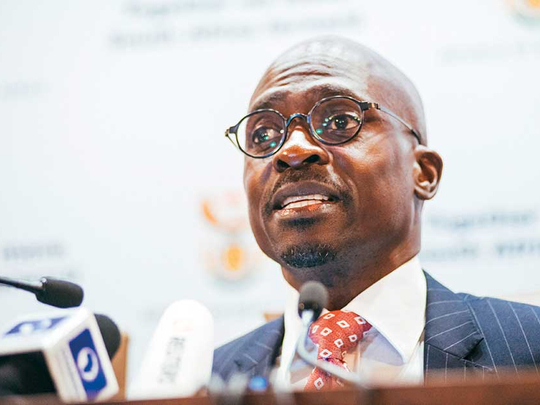
Washington: South Africa’s newly appointed Finance Minister, Malusi Gigaba, should be given time to settle into the job before being judged on his performance, according to central bank Governor Lesetja Kganyago.
President Jacob Zuma’s decision to fire Pravin Gordhan as finance minister hasn’t affected ties between the central bank and the National Treasury, Kganyago said in an interview on Thursday in Washington.
The minister “needs to be given time to create the rapport with his team at the Treasury,” he said. “It’s a very competent team and hopefully, he is able to hold on to that team.”
The remarks seek to ease concern that Gordhan’s dismissal will affect the country’s fiscal and economic policies. The cabinet reshuffle at the end of March prompted S&P Global Ratings and Fitch Ratings Ltd. to cut South Africa’s credit rating to below investment grade, causing the rand to weaken against the dollar. While the currency has since trimmed its losses as investors sought higher emerging-market yields, the downgrades risk undermining investor confidence in Africa’s most-industrialised economy.
Policy intact
Gigaba plans to meet with Moody’s Investors Service during his current visit to the US to reassure the ratings company that fiscal policy won’t change, the minister said this week. Moody’s placed South Africa on review for a downgrade after Gordhan was fired. Treasury Director-General Lungisa Fuzile has since announced he will step down next month.
Kganyago, a former head of the Treasury, said he’s already held two “very cordial, very extensive” meetings with the finance minister and his deputy to discuss the challenges facing the economy.
“We have got a long relationship,” Kganyago said of Gigaba. “What you always need in a minister of finance, it’s not an economic guru, you need someone who knows the politics. The Treasury is endowed with a depth of talent, capable of putting together fiscal options.”
The rand on Thursday reached its strongest level against the dollar since the reshuffle after having erased its 10 per cent gain for the year. It gained 0.1 per cent to 13.1431 per dollar by 1.15pm in Johannesburg on Friday.
Kganyago and Gigaba are in charge of reviving an economy that the World Bank expects to expand less than 1 per cent for the second year in a row. The central bank, however, is sticking to its forecast of a 1.2 per cent expansion for now, the governor said.
“We still have a view of an economy that it’s improving but still in a low-growth trap,” he said. The Monetary Policy Committee will “take stock” of the latest economic developments when it meets again in May, he said.
The MPC has kept the benchmark interest rate unchanged since last March after raising it by 200 basis points to 7 per cent over two years to curb consumer prices. Inflation eased in March to 6.1 per cent, the lowest level in six months and just outside the upper end of the central bank’s target band.
The monetary policy stance “strikes the necessary balance between dealing with inflation and supporting the nascent economic recovery,” Kganyago said.












